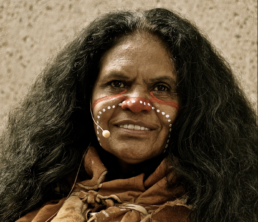These life stories may contain descriptions of childhood trauma and abuse, as well as images, voices and names of people now deceased. If you need help, you can find contact details for some relevant support services on our support page.
Distinguished Aboriginal Australian opera singer and actor, Maroochy Barambah (b. circa 1950s), was in foster care as a teenager.
Maroochy Barambah was born Yvette Isaacs in Cherbourg in Queensland. She is of Turrbal and Gubbi Gubbi descent, and also has bloodline connections to Wakka Wakka, Kamilaroi and Birri Gubba Country. She is the Songwoman and Law-woman of the Turrbal Tribe.
As a child, Maroochy Barambah lived in dormitories at Cherbourg and was a member of the Aboriginal Inland Mission choir. Cherbourg, known as Barambah Aboriginal Settlement until 1932, was set up as a settlement for Aboriginal people under the Aborigines Protection Act of 1897. It is over 260 km northwest of Brisbane and is the land of the Wakka Wakka people.
On the settlement, the government administration controlled almost every aspect of Aboriginal peoples’ lives; the language they spoke, what they ate, what they wore, where they went, for whom they worked and, in some cases, whom they would marry. Aboriginal people, removed to Cherbourg were either placed in dormitories or lived in camps. Large numbers of boys and girls, men and women were brought up away from families in the dormitories. Anyone breaking the strict laws were severely punished – locked up in jail or sent away to other reserves like Palm Island and Woorabinda (Find and Connect).
When she was thirteen, Maroochy Barambah was sent to live with a white foster family in Melbourne, where she attended school as part of the Harold Blair Aboriginal Children’s project. While living in Melbourne, Maroochy Barambah was often visited by Uncle Zac Martin, an actor of Gubbi Gubbi descent, who asked her to “record the stories and legends of his people” (Deadly Vibe Magazine). Years later, these stories would be told through songs and poetry in her first full-length album, Once Upon a Dreamtime.
During the 1970s Maroochy Barambah was able to attend the Melba Conservatorium of Music on a scholarship and the Victorian College of Arts. She graduated in 1979 and went on to establish her own jazz group and sing in the indigenous rock band, Quokka.
In 1982, Yvette changed her name to Maroochy Barambah “as a statement of pride in her Aboriginality” (The Australian Women’s Registry). In the same year, she appeared in Episode 3 of the Women of the Sun historical drama series.
In 1989, Maroochy Barambah performed in the award-winning Sydney Metropolitan Opera production, Black River, which addresses black deaths in custody. She was the first Aboriginal Australian to perform opera on stage.
Maroochy Barambah was awarded the inaugural Aboriginal performing arts fellowship in 1991 by the Aboriginal Arts Committee to pursue classical opera singing as a career.
References:
Kovacic, Leonarda and Lemon, Barbara. “Barambah, Maroochy (c. 1950 – ).” The Australian Women’s Register, 2006. http://www.womenaustralia.info/biogs/AWE1171b.htm
O’Neill, Cate. “Cherbourg Aboriginal Settlement (c. 1904 – 1986).” Find & Connect, 2018. https://www.findandconnect.gov.au/ref/qld/biogs/QE01069b.htm
“Swan Song – Maroochy Barambah’s Bumper Year.” Deadly Vibe Magazine, Issue #7, August, 1997. https://deadlyvibe.com.au/1997/08/swan-song-maroochy-barambahs-bumper-year/
“Welcome to Country Ceremony.” Turrbal. https://www.turrbal.com.au/welcome-to-country-ceremony
Image available here.
